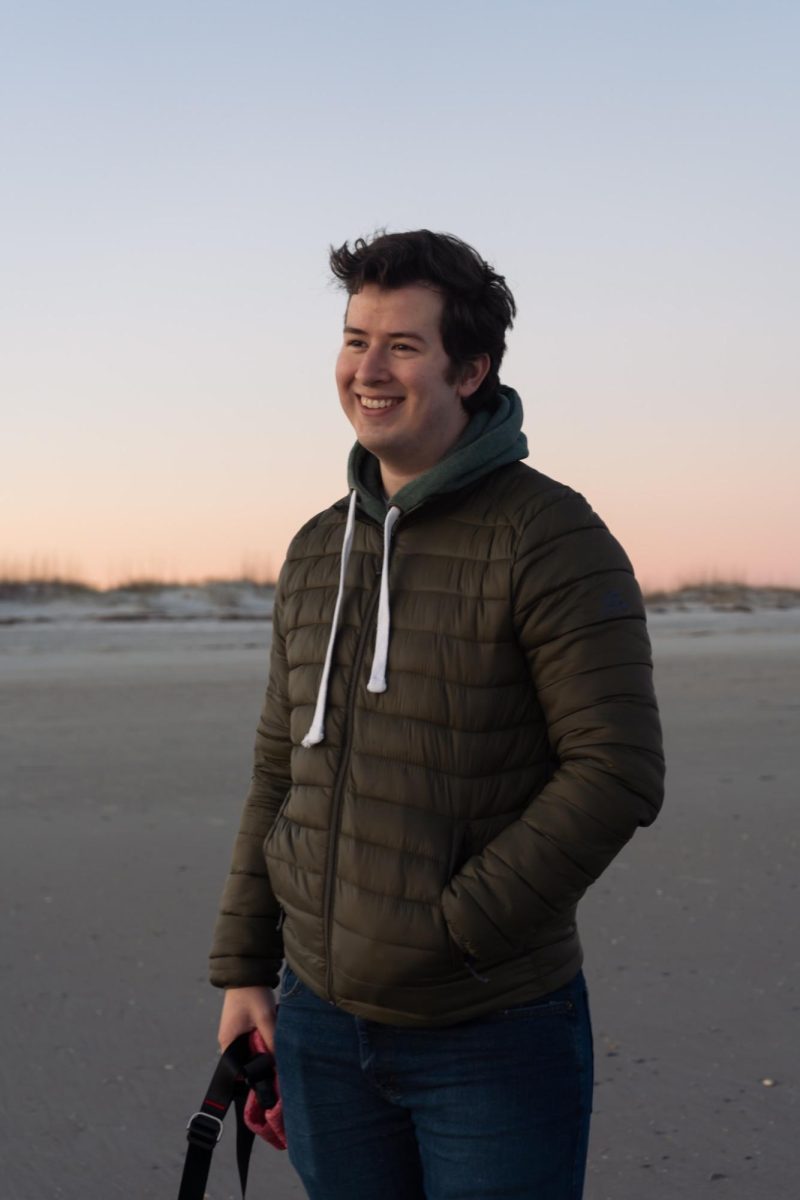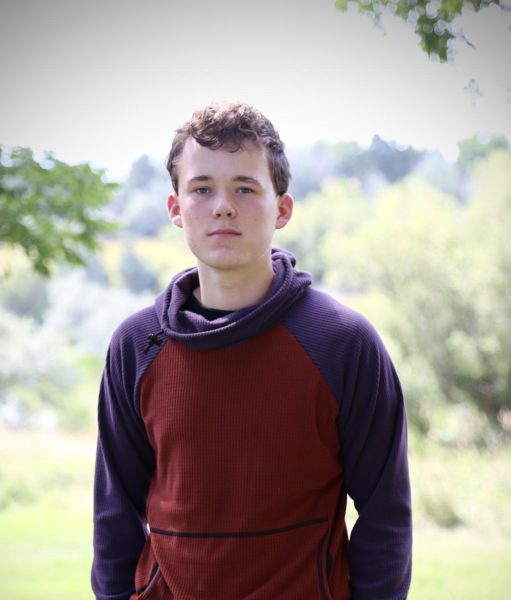“I think for teacher’s we have a contract that says we have to be in the school building at 7:35 and our job ends at 3:35 or 3:45. To the frustration of my students sometimes, for my own betterment it’s necessary to stay true to that. I don’t take work home ever. My life is my life, and I like having a life that isn’t defined by work and school.”
So begins Michael Villanueva about just a small part of his story.
Villanueva shares, “I studied philosophy in high school and college, and that’s what one of my majors was.” While he originally “wanted to be a lawyer,” he quickly found that he “hated all of the pre-law people that I was working with.”
However, he was willing to pivot, stating, “I benefited in a lot of ways from the community that I was around and society, and I thought that it was only fair and just if I then contribute in some way. I couldn’t see myself working in waste management, or other necessary jobs that need to happen, but the puzzle piece that I could fill in was education.”
Villanueva worked hard in college, which eventually culminated in him earning a double major in history and philosophy with a minor in political science. He reflects on how “I came into college with 22 credit hours from AP classes, and that enabled me to take a couple extra classes and I graduated a year early.”
He explains that this is why, “I push the value of AP classes a lot in my own classes; it probably saved me 25,000 dollars.”
Villanueva then went on to University of North Carolina Chapel Hill, earning a graduate degree and master’s of arts and teaching. He clarifies that “I got a dual degree in part for social studies and also in part for English as a second language, which is where I started teaching.”
Despite the multiple degrees he received, Villanueva reflects that “you need a lot of education to do something that doesn’t pay for all of that education.” He adds, “For me, I knew I wanted to go to college, and I didn’t really truly understand what loans would do to my life, and now, I try to be transparent…I try to be transparent because of how much money matters.”
Villanueva adds, “I think teachers complain a lot about money, and for me and my own particular instance that’s one of the main inhibitors to me feeling fully invested and passionate about doing this (teaching).”
However, Villanueva knows there are also challenges facing teachers that don’t involve the monetary side of life, explaining, “There’s always questions of ‘did I do that the right way?’ It’s really hard for me to walk away from things where I think I did something wrong, or I know I did something wrong and just let it go.”
Even with the problems he faces, Villanueva also is grateful for the rewarding aspects of teaching, sharing, “I’m young, I don’t have my own kids, but I still find it rewarding to be able to help other people plan their future. I think in my own life I would do a lot of things differently from my transition from high school into college and then adult life. I think being able to help at least warn people [about costs] , that’s the major thing.”
He adds, “I didn’t have anyone warning me about college loans. I knew that they made a lot of things accessible to me, but I didn’t know long term what effect that would have on me, or if I did, I just didn’t care. I like being able to show people the things that were difficult in my own life so that they can hopefully make a better informed decision in their own lives that I didn’t.”
Villanueva also loves interacting with people, explaining, “I could never work a cubicle job. That sounds awful to me, and I know some people would thrive without having to interact with people, but I like being able to interact with different personalities, and I like being able to interact with a funny diverse group of people.”
Every teacher has at least one constant: students. For Villanueva, he thinks that in a lot of different ways, students humble him. “Sometimes it’s just I learn a new perspective that I wasn’t aware of. I went to a very homogeneous school from 5th to 12th grade, so I had a lot of people who had similar backgrounds to me. When I 1st started teaching, I was introduced to a lot of people from vastly different backgrounds from me.”
He adds that this “helped me become more aware of kids in my own area, and also just understanding humanity a bit better and the kind of grace the people need. I think it’s made me a more patient and flexible person, and I think working with students, it’s rewarding in that you get to see someone grow.”
Villanueva also stresses something that’s incredibly important to him: that after high school, if you can’t manage your time, “you’re either going to get fired because you’re not doing your job or you’re going to fail because most of college is just free time. If you can’t manage your own time, then you’re wasting money.”
With this being said, he still emphasizes that “ultimately I want my students to be happy” while he also doesn’t want them to “make a mistake that has long lasting, expensive but also emotionally draining impacts.”
Another commitment that Villanueva has is to the sports program that he runs; specifically, Arvada West Esports. “One of the things that I love is how polarizing it is. The fact that it’s called Esports in of itself is a fun debate that I’ve had with various people across the school, specifically Gallup (John Gallup) finds it very ‘oxymoronish’ if that’s a word” he shares.
“I understand where he’s coming from, and to some extent agree with him, but at the end of the day it’s also like a really good opportunity for students who aren’t typically celebrated for what they’re good at in their life” he adds.
Villanueva has also noticed plenty of opportunities that go along with the sport:
“I had a community college reach out to me about full-rides and scholarships and championships and offering to meet with students to talk about life after high school if they want to pursue getting money for playing a video game,” he shares.
He explains that in terms of the video game community, “For some it’s been a really good opportunity to learn about how to make friends, whether it means they just have a need to learn how to interact socially, but what’s wrong or bad about having another community open to people?”
Villanueva then pauses, thinking for a second. He begins to embark on a metaphor, sharing, “They have in Inuit languages 20 or 30 different words for snow and different types of snow…but in English we just have the word snow. We might have sleet, but we use the word snow. We’re getting to a point where sport is in that category, where there’s a lot of stuff that people try to pass off as a sport. If I’m going to sit here and listen to golf or chess or other things be called a sport, then yeah I’ll throw in Esports as well.”
However, sports of the electronic kind aren’t the only ones Villanueva enjoys. He states, “I love sports, I love going to live sporting events. I have season tickets to the Rapids that I go to a lot, I have friends that have season tickets to other teams in the city. I’ll go to Nuggets games whenever a friend invites me.”
He further explains, “I’ve always been interested in sports and organized teams that I follow. I like the Nuggets a good bit…I love UNC Chapel Hill, not the UNC Greeley that my colleagues are so fond of saying is ‘The UNC.’ I loved that college, it gave me a lot. Pretty much whatever’s on, I’m down to have it on and in the background.”
Adding a bit about his personal life, Villanueva states, “I speak a bit of Spanish, I used to have to speak it every day, so I was fluent enough where I was translating for other teachers. The students population is very different here, so I don’t practice every day and I’ve felt it dwindle down a little bit, but I can still hold a conversation, I could still call a family without a translator and say, ‘I’ve loved having your kid’ or ‘They’re failing, and this is what they need to do.’”
He provides context, explaining, “My father is from El Salvador; he speaks Spanish. My grandmother lived with us; she speaks Spanish. They also spoke English, but I had family members who only spoke Spanish. My family didn’t teach me when I was growing up, but I was surrounded by it the whole time.” He adds, “I think after a little bit of exposure and just working with students full time in Spanish that accelerated what I wish my family had taught me when I was younger.”
Villanueva reflects back on his start as he concludes his thought, sharing, “When I first got involved, it wasn’t personal.” However, as he has watched his students grow (and his own growth, in turn), he realizes that “I have this emotional attachment that goes along with that logical goal.” And that is a very special thing indeed.



